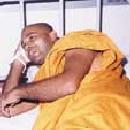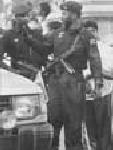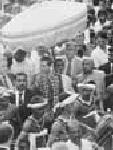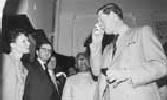

![]()
A Foundation for the freedom of expression has welcomed acquittal of the ‘Lakbima’ Editor, Bandula Padmakumara from charges of criminal defamation.
“No doubt there will be many studied comments on the judgement of the learned judge of the High Court in acquitting Mr. Padmakumara, which has referred to many aspects of the practice of journalism, and the responsibilities of journalists. Such comment and discussion will be healthy for democracy and media freedom, the statement signed by the convenor of the Foundation, Lucien Rajakarunanayake said.
“We wish to state clearly that our organisation is opposed to the retention of the law of Criminal Defamation in our statutes, and specially its use against journalists, which can act as means of threatening journalists, and thereby act against the freedom of the journalist and the freedom of expression,” the statement said. “We trust this matter would be given the highest consideration in the deliberations of the Parliamentary Select Committee on Reform of Media Law which has now been constituted,” it said.
It was peak traffic time in the main road leading out of the city centre. As thousands of people and vehicles were leaving at the end of a tense and traumatic week, the bizarre story had not yet ended. Another bomb explosion was awaiting the crowd.
The Sunday Times spoke to some of the injured people to portray the scene of utter chaos and commotion on Friday in the Kompannaveediya area.

Ven. Kithsiri Pannasekera
A bus heading towards Pettah was few yards away from where the explosion took place and in the opposite direction a packed bus had just passed by. Thankfully only a few persons in the two buses were injured.
The Ven. Kirthisiri Pannasekera Thera who had come to Colombo a few days ago was to return to his temple at Agalawatte on Saturday. On Friday the monk had left the temple he was staying in Borella around 5.00 pm. He went to Osu Sala to buy some medicine and then proceeded towards Fort in a 138 private bus.
Just as the bus was nearing Kompannaveediya the passengers heard a massive explosion. The monk who was occupying the front seat was thrown off his seat, while others scrambled to get out from the jam-packed bus.
The monk told The Sunday Times that at first most passengers thought some explosion had taken place in the bus. The noise was so loud that the bus seemed to fall apart. While panic-stricken passengers pushed their way out, pieces of glass were scattered all over.
“I struggled out and tried to find my way back to Borella. Though feeling dizzy, I knew where I was going. But just as I was about to get into another bus I held my head and felt pieces of glass. I was developing a headache, so I struggled towards the hospital,” the monk said.
K.G. Padmabandu, father of two from Piliyandala, said he was travelling in a three wheeler when the explosion hit the cab.
“I was at the roundabout when it happened. The three wheeler shook and I felt myself being hit,” he said. Mr. Padmabandu was later treated in hospital.
Independence Week, in many ways, denied an untold number of free Lanka’s citizens the spoils of liberty, restricting constitutionally-guaranteed freedoms and visiting upon their rights other hardships.
Thousands of Sri Lankans travelling in-and-around Colombo — immediately before and after February 4 — were trapped in seemingly endless traffic jams, and many were forced to undergo the humiliation of security checks and body searches.
Independence Week virtually imprisoned these people, placing under house arrest those who were confined to their homes during the Golden Jubilee commemoration. Most turned up late to work, while medical and essential services workers, who were turned back by security enforcers, never reported for duty at all, The Sunday Times has learned.

Crack commandos engaged in security checks
The pandemonium also impacted severely on supplies of food and other essential materials going into the city, leading to a steep rise, according to marketplace reports, in fish and vegetable prices.
All because the Government chose to seal off the capital and its approaches intermittently, so as to facilitate and secure the commemorative movements of Prince Charles and other foreign and national VIPs.
Beginning on Tuesday evening, the eve of Independence Day, at 6:00pm all lorries were banned from entering Colombo, a move seen as deterring any possible Black Tiger truck-bomb attacks. On Wednesday, Galle Road, the capital’s other arteries and roads leading to Parliament, were transformed into ghost streets for around nine hours. And when it was over, traffic again screeched to a halt in order to make way for the commemoration’s Chief Guest, who was winding up his 72-hour royal visit to Sri Lanka.
As a result of the travel restrictions, traffic going in and out of the capital to the outstations was backed up for miles, and delays of up to three hours and more were reported over the week.
“Ninety percent of my colleagues did not report to work, and even by Friday only about twenty-five percent came,” said A.K. Keerthiratna, a Municipal official.

Prince Charles at British Council
“Nothing seemed to be in order and even bus drivers were unable to report for work,” added a representative of the Fort-based Central Bus Stand.
By another account, for the first time in her life S. Sandanayaka had to walk to office:
“There was no possible way for people to travel, not only in and around Colombo, but in the Rajagiriya area also. It was a choice of whether one will walk to work or stay back at home. Either way it is the ordinary citizen who will lose.”
On Independence Day, the ordinary citizen was affected, indeed, in other ways.
The city’s essential services, for one, were directly hit by the chaotic transportation scene, as doctors and other medical workers were turned back at military and police checkpoints. Hospital officials reported that, due to this unexpected understaffing, their emergency wards and other facilities would have responded ineffectively had a crisis struck on February 4.
“We planned out a contingency plan in case of a disaster,” said an official at Sri Jayawardenapura Hospital. “But with only a few doctors, we would have faced a major crisis, if there actually had been a disaster.”
Medical workers also complained to The Sunday Times about the government’s failure to provide them with security clearance and transport to their stations on Wednesday. This despite Transport Minister’s A.H.M. Fowzie’s later complaining that Traffic Police never consulted him before the city-wide security net was deployed.
Hospitals weren’t the only public places to be affected over Independence Week. The lorry travel ban led to reports of severe shortages of produce at Manning and St. John’s Markets — Colombo’s main wholesale and retail outlets for vegetables and fish — and other markets, while long queues were spotted at petrol sheds across the capital.
“For the past two decades, it is very seldom that we have closed down Manning Market,” said Jerrad Karunaratna, a green grocer who keeps a stand at Colombo’s main vegetable outlet. “That too was during a curfew or so, but this time we were forced to close down due to non-availability of supplies.”
The shortage caused vegetable prices to shoot up. Over the week, the wholesale price of leeks rose from Rs. 40 to Rs. 60 a kilo, with ash plantains increasing in value by Rs. 10 a kilo, and the cost of carrots nearly doubling from Rs.40 to Rs. 70 a kilo.
The rights of Sri Lankans to food and free movement were severely affected by Independence all right. But perhaps the greatest indignity suffered by free Lankans last week was one generally reported to The Sunday Times, by those who were suspected by the security forces of possibly engaging in acts of terror .
Throughout commemoration week, Philip Weragoda, a three-wheel driver, was stopped at checkpoints across the city. Observing that he was constantly harassed by security enforcers, he described them as zealously enforcing their powers over the common man:
“We are sad at the way our Independence was celebrated. The road blocks affected my income, and the ordinary citizen was not allowed to witness the event live. I was, in fact, stopped at Borella and told that they could not accept my National Identity Card and therefore could not be allowed to proceed.”
During Independence week, Weragoda was not alone in experiencing such humiliation, but for others like Aravinth Swampillai, a Tamil student it was all the more so. He had to undergo body searches and, worse, like so many of his ethnic brethren, face the possible threat of detention by the security forces under the E.R. and P.T.A.
“We have no independence now,” was how Swampillai put it bluntly. “Every person has to keep on showing their identity cards.”
An estimated 30,000 Police and army personnel were deployed for the security arrangements for the independence celebrations in Colombo as many of the civilians underwent severe security checks during the past few days.
Additional checkpoints, more cordon and search operations and even body checks being carried out as people walked along the streets seemed to be common sight in and around Colombo over the week.
‘People were virtually kept under house arrest and it was contrary to what people expected on the day of independence’, L. Piyasena, a security guard who walked more than five kilometres to get to his place of duty said.
‘I am thinking whether it is worthwhile that the people have to undergo so much of harassment in order to have this celebrations’, he said.
Most of the Police officers and Army personnel on duty said they were brought in from outstations including from the front-line to provide security to the city.
The armoured cars brought in for display at the independence parade were being transported by train the following day under heavy security towards Vavuniya while some of the trains on the Colombo-Vavuniya main line were either delayed or cancelled.
The general public caught but a fleeting glimpse of Britain’s Prince Charles during his brief stay in Sri Lanka, yet they certainly felt his presence.
From the time he and his entourage touched down at Katunayake on Tuesday, till the moment he took off for the relative safety of the Himalayas nearly 72 hours later, the royal visit was executed with Swiss-watch precision despite some minor adjustments and omissions to the official programme.
The security surrounding his anticipated arrival and movements here was among the tightest ever reserved for a visit by a foreign VIP. So much so that, much to the collective headache of Colombo and outstation-bound commuters and motorists, they were gridlocked in traffic jams, seemingly for hours on end, or subjected to thorough security checks.

Prince Charles at Kelaniya Raja Maha Viharaya
And ironically, only hours after he flew away on Friday, an LTTE suicide squad struck at the heart of Colombo, shattering any illusions that the security enforced for Prince Charles’ visit might have had a lasting effect on the capital.
The ring was so tight that the only threat to the heir to the British throne’s safety appeared to come at the outset, while he was being welcomed upon his arrival at Bandaranaike International Airport. In a scene reminiscent of a Keystone Cops film sequence, a stray dog who, driven into a frenzy by shots fired by an Air Force honour guard in the middle of a 21-gun salute to the Prince of Wales, bolted along the red carpet that had been laid out for him.
Then, much to the delight of the buzzards in the national and western press corps who lapped it up, the detail of airmen became so distracted by the mutt’s movements, that they bungled their salute, somehow setting the grass next to them on fire. The fire brigade was then called in to extinguish flames that threatened to engulf the tarmac, and medics arrived to attend to an injured airmen, while the prince, true to the form of a British Airways pilot, appeared to remain ice-cool under pressure.
But, from that point on, it was all strictly business for Charles. He kept to a tight schedule, advancing British interests in Sri Lanka and further cementing Lankan-British ties, but mostly behind closed doors.

Talking to members of the English Chamber Orchestra
Highlights of his programme included: a visit to the Courthaulds clothing factory in Katuwellegama and the Kelaniya Raja Maha Viharaya ; his attendance at an English Chamber Orchestra concert staged in his honour at Bishop’s College; his laying of a foundation stone for the British Council’s new “Millennium” wing; a 20-minute stop at the Singhalese Sports Club cricket ground, where he watched and even played with members of the England-A squad; and his being hosted, along with other foreign dignitaries, by President Chandrika Bandaranaike Kumaratunga at a State Banquet.
But even at the event that brought him to Sri Lanka in the first place, Wednesday’s Golden Jubilee commemoration, at which he had been invited to preside as Chief Guest, the Sri Lankan public hardly heard a peep out of him. He made an early exit, as it turned out, driving to Bentota on Wednesday afternoon, where he lunched unofficially with Geoffrey Bawa, Sri Lanka’s most famous architect.
Throughout the hour or two when he did stick around at the Golden Jubilee, he appeared bored. Seated in his honorary chair, he politely leafed through his commemorative booklet, and occasionally seemed close to succumbing to jet lag.
Perhaps, in hindsight, he was trying to strike a pose of resplendent meditation in some personal quest for Nirvana. During his visit, after all, Prince Charles had inquired from Siran Deraniyagala, the Archaeological director at Kelaniya, just how one went about achieving the lotus position.
“He wanted to know what one should do to receive enlightenment,” Mr. Deraniyagala said.
Continue to the News/Comment page 5 * From the blue corner UNP must learn to oppose * Counter proposal receives mixed response * Congress pledges to book conspirators
Return to the News/Comment contents page
![]()
| HOME PAGE | FRONT PAGE | EDITORIAL/OPINION | PLUS | TIMESPORTS
Please send your comments and suggestions on this web site to
info@suntimes.is.lk or to
webmaster@infolabs.is.lk